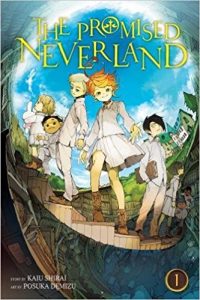The Promised Neverland by Kaiu Shirai and Posuka Demizu
This series is one of more intriguing debuts that I’ve read from the Shonen Jump line in a long time. It is also a very difficult series to write about due to a pretty dramatic plot twist that happens around 40 pages into the manga, but I’m going to be deliberately vague and avoid spoilers.
The series opens with a semi-idyllic portrayal of life in an orphanage in what looks like a non-specific European country. Emma, Norman, and Ray are some of the oldest orphans, and each is gifted with some special talents. Emma is a tremendous athlete, Norman is incredibly smart, and Ray is a strategic thinker who is constantly honing his powers of observation. The orphans are cared for by a woman named Mom, who they all love as the only adult in their lives. As the first few pages unfold, small details in the art start to unsettle the reader. Why do all the orphans have numeric sequences tattooed on their necks? Why do they all have to dress in white? Why are they subjected to what looks like insanely detailed IQ tests in the morning, and then given the freedom to roam around the woods that surround the orphanage in the afternoon?
The orphans make a discovery that causes them to question the environment that they’ve been raised in, and their unique personalities and perspectives cause them to band together to start to assess their situation and develop a plan of action. While Emma is smart, one of the greatest things she brings to the team is moral clarity and a sense of urgency. The two boys are more cerebral, with Norman being more book smart, and Ray serving as a mastermind who is initially focused most on what is practical to accomplish. This volume focuses mainly on the orphans testing their assumptions and working together to figure out how The Promised Neverland doesn’t really live up to the fairy-tale aspects of the title. The art in the series features faces that are a but smushy, but very expressive of emotion. Emma’s hairstyle looks like a reference to Duck in Princess Tutu, so I found that amusing. The Promised Neverland is incredibly dark, but seeing how resourceful the orphans are brings an element of hope into play for the reader. The first volume of the series easily draws the reader into the sinister world the orphans are resisting. Extremely entertaining, and I’m already impatient for the next volume.

Speak Your Mind